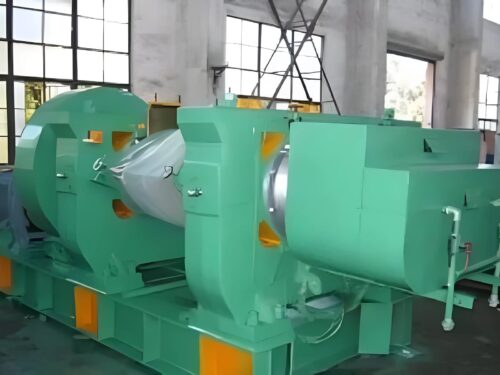Efficient Rubber Processing with High-Performance Refiner

Rubber is one of the chief raw materials used in the automobile, medical, and many more industries. An efficient method of processing has been considered crucial to meet the expectations of high quality in rubber products. In rubber processing, raw rubber is treated and conditioned for further manufacturing in the pre-refining process. The equipment associated with this particular process includes a high-performance pre-refiner mill, which significantly influences efficiency and quality.
What is a Pre-Refiner Mill?
A pre-refiner mill is an early treatment device utilized for rubber processing. It tears the block into a size that can be handled easily. This is the preparation process for further refining and processing mixing and vulcanization steps. A pre-refiner mill reduces the size of the rubber material, thus facilitating its blending and assuring uniformity in the end product.
Importance of Efficient Rubber Processing –
Efficiency is important for several reasons to complete the manufacturing process of rubber:
- Cost: The energy consumed in refining and manufacturing labor is also used less as it processes. It also means less waste, which means that raw materials are used as much as possible.
- Quality: A refined product must have consistent and expected properties like elastic retention and durability. In the automotive industry, this results in safety failure when even small defects are produced.
- Environmental Sustainability: Proper processing eliminates waste and decreases the energy required in the production process, thus becoming environmentally friendly.
How Does an Efficient Pre-Refiner Mill Enhance Efficiency?
High-performance pre-refiner mills are one of the most important options for achieving optimized rubber processing. Let’s discuss a few of these key features and benefits:
- Precision reduction of materials: A pre-refiner mill simply reduces large pieces of rubber into smaller, uniform pieces. High-performance mills want to be as accurate as possible in size reduction so that batches can be consistent. Even size reductions of the materials ensure that subsequent processes, like mixing, should be smooth and efficient.
- Increased Output: High-performance pre-refiner mills can process large volumes of rubber at relatively faster speeds. This increases the overall throughput, therefore cutting the time it would take to process. Faster processing will also enable manufacturers to increase production speed without lowering the quality of the product produced. This is especially important in operations that are always in high demand, such as tire manufacturing.
- Energy Efficiency: Today, energy efficiency is the greatest principle in which the design of a contemporary pre-refiner mill thrives. It saves power and is used better. Energy-efficient appliances not only save operational costs of any setup but also make the entire process of manufacturing more environmentally friendly. If a company reduces its use of energy, then it can cut down on carbon footprint and live up to the environmental compliances.
- Durability and Longevity: High-performance pre-refiner mills are made from very strong materials that can operate for a long period with minimal maintenance. The outcome is reduced time to shut down resulting from machine failure or the need for repairs and overall productivity.
- Low Labor and Maintenance Costs: Advanced pre-refiner mills automate various parts of the refining process, reducing labor input. They also feature designs that simplify maintenance, providing quick access to critical components. This reduces maintenance time and costs, giving operators more time to focus on other important tasks.
Advantages of Advanced Pre-Refiner Mill for Rubber Manufacturers –
Rubber manufacturers will benefit in the following ways if they employ a high-performance pre-refiner mill:
- Accelerated Productivity: Increased processing accelerates the quantity produced in a shorter period.
- Uniformity of Product Quality: Consistent particle reduction contributes to product quality due to homogeneity
- Operational Cost Efficiency: Energy usage, labor, and maintenance expenditure reduction aids in cost-cutting
- Environment-Friendly Activities: Savings of energy through such machinery also save money for manufacturers but help them in trying to go green and reduce their impact on the environment.
Conclusion –
Rubber processing is a complex and fundamental part of the manufacturing system. With the ever-increasing demand for rubber products, the need to have efficient, high-performance equipment in manufacturing processes is imminent. The pre-refiner mill is one of the most important parts of this process, and by upgrading to a high-performance model, efficiency, product quality, and overall operational success will be enhanced.
For More Information Visit Here

 Compression Molding
Compression Molding